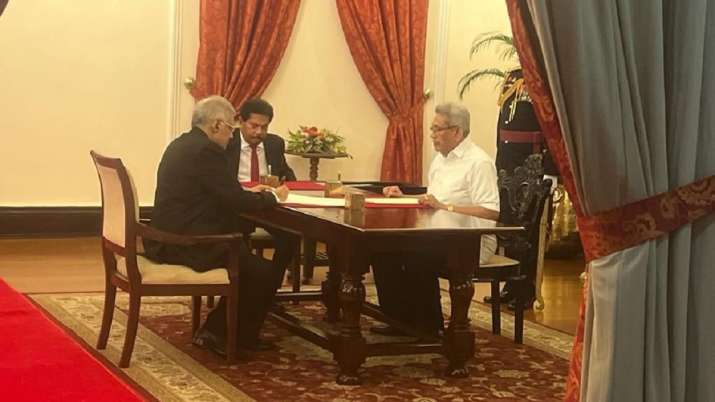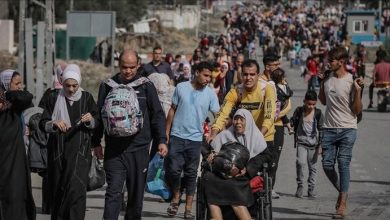Sri Lanka: Ranil Wickremesinghe becomes new Prime Minister amid economic crisis

Sri Lanka political update: United National Party leader Ranil Wickremesinghe has been appointed as the new Prime Minister of Sri Lanka.
The 73-year-old United National Party (UNP) leader took oath before President Gotabaya Rajapaksa at a ceremony in the president’s office after they held closed-door discussions over formation of a new government to address the economic crisis.
Sri Lanka was without a government since Monday when Gotabaya’s elder brother and prime minister Mahinda Rajapaksa resigned after violence erupted following an attack on the anti-government protesters by his supporters. The attack triggered widespread violence against Rajapaksa loyalists, leaving 9 people dead.
“Congratulations to the newly appointed Prime Minister of #lka, @RW_UNP. I wish you all the best as you navigate these troubled times,” tweeted Mahinda, who is under protection at a naval base following violent attacks on his aides.
India’s reaction
The High Commission of India in Colombo said it looks forward to working with new Government of Sri Lanka formed in accordance with democratic processes.
“High Commission of India hopes for political stability and looks forward to working with the Government of Sri Lanka formed in accordance with democratic processes pursuant to the swearing in of Hon’ble @RW_UNP as the Prime Minister of #SriLanka,” it tweeted.
It said that India’s commitment to the people of Sri Lanka will continue.
Congratulations to the newly appointed Prime Minister of #lka, @RW_UNP. I wish you all the best as you navigate these troubled times.
— Mahinda Rajapaksa (@PresRajapaksa) May 12, 2022
Wickremesinghe: A five-time PM
Wickremesinghe, a lawyer-turned politician who has been in Parliament for 45 years, has served as the prime minister on four previous occasions. He was fired from the post of prime minister by then President Maithripala Sirisena in October 2018. However, he was reinstalled as the prime minister by Sirisena after two months.
He is widely accepted as a man who could manage the economy with far-sighted policies, and is perceived as the Sri Lankan politician who could command international cooperation.
He later found his way to Parliament through the sole national list allocated to the UNP on the basis of cumulative national vote. His deputy Sajith Premadasa had led the breakaway SJB and became the main Opposition.
Premadasa, a former deputy to Wickremesinghe, had rejected the President’s original invitation to be prime minister. He had insisted that the President must resign as a pre-condition. Premadasa later softened his stance and demanded the President to give a time frame for stepping down. However, the President replied that he would appoint Wickremesinghe as the new premier.
Sri Lanka’s crisis
Sri Lanka is facing its worst economic crisis since gaining independence from Britain in 1948. The crisis is caused in part by a lack of foreign currency, which has meant that the country cannot afford to pay for imports of staple foods and fuel, leading to acute shortages and very high prices.
In a late night televised address to the nation, President Gotabaya on Wednesday refused to quit but promised to appoint a new Prime Minister and a young Cabinet which would introduce key constitutional reforms to curb his powers.
Gotabaya had said that after appointing the new Prime Minister, and Government a constitutional amendment will be moved to enact the content of the 19th Amendment to the Constitution, which will vest more powers with Parliament.
Security forces in armoured vehicles patrolled across the country on Wednesday with orders to shoot at sight amid continuing protests at the government’s handling of the worst economic crisis. Army Special Forces’ Combat Riders were also deployed on mobile patrol in Colombo and suburbs.
President Gotabaya earlier urged the public to reject subversive attempts and said it is the time for all Sri Lankans to join hands as one, to overcome the economic, social and political challenges.
The powerful Rajapaksa clan has dominated Sri Lankan politics for years. Gotabaya is the last Rajapaksa family member in office and the resignation of his brother as prime minister did nothing to placate demonstrators or bring calm in the island nation.
As the crisis erupted, Gotabaya sacked his younger brother Basil Rajapaksa. Later, the entire Cabinet resigned, forcing the eldest Rajapaksa, Chamal to quit.





